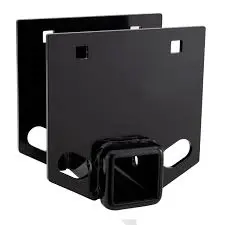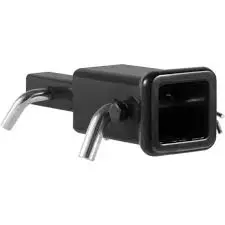Why Is the Receiver Adapter Hitch a Must-Have for Towing?
2025-04-10 11:07:58
In the world of towing and transportation, versatility and compatibility are paramount. The Receiver Adapter Hitch emerges as a critical solution for anyone seeking to optimize their towing capabilities. This innovative piece of equipment serves as a transformative tool that allows vehicle owners to seamlessly adapt their hitch sizes, ensuring maximum flexibility across different towing scenarios. Whether you're a weekend adventurer, a professional hauler, or someone who requires occasional trailer transportation, the Receiver Adapter Hitch represents a game-changing accessory that solves multiple logistical challenges with remarkable simplicity and efficiency.

Understanding the Fundamental Importance of Receiver Adapter Hitches
The Evolution of Towing Compatibility
Modern transportation demands versatility, and the Receiver Adapter Hitch represents a pinnacle of engineering designed to meet this need. Traditionally, vehicle owners faced significant limitations when attempting to use different trailer accessories or change towing configurations. The Receiver Adapter Hitch fundamentally transforms this landscape by providing a universal solution that transcends traditional size constraints. Manufactured with precision by industry leaders like Qingdao RUIRUI Machinery Co., these adapters are crafted from heavy-duty steel, ensuring durability and reliability across diverse towing applications. The technical sophistication of the Receiver Adapter Hitch lies in its ability to convert between standard hitch sizes, typically from 1.25-inch to 2-inch receivers. This seemingly simple mechanism opens up an entire ecosystem of towing possibilities. Engineers have meticulously designed these adapters to maintain structural integrity and weight-bearing capacity, with most models capable of supporting loads up to 5,000 pounds. The corrosion-resistant powder coating further enhances the product's longevity, protecting it from environmental challenges and ensuring consistent performance. Manufacturing excellence plays a crucial role in the Receiver Adapter Hitch's reliability. Companies like RUIRUI Machinery employ advanced processing technologies, including progressive stamping, laser cutting, and precision welding, to create products that meet stringent quality standards. Their commitment to technological innovation means that each Receiver Adapter Hitch represents not just a mechanical component, but a carefully engineered solution designed to solve real-world towing challenges.
Technological Innovations in Hitch Design
The technological landscape of Receiver Adapter Hitches has undergone remarkable transformations in recent years. Modern designs incorporate advanced materials and manufacturing techniques that dramatically improve performance and user experience. High-strength steel alloys, precision machining, and sophisticated coating technologies have revolutionized how these adapters function. At the core of these innovations is a deep understanding of mechanical stress and material science. Manufacturers like RUIRUI Machinery utilize computer-aided design (CAD) and finite element analysis to model potential stress points and optimize the Receiver Adapter Hitch's structural integrity. This means that each adapter is not just a passive component but an actively engineered solution that can withstand significant mechanical loads while maintaining exceptional reliability. The integration of advanced metallurgical techniques allows for remarkable weight reduction without compromising strength. Modern Receiver Adapter Hitches are substantially lighter than their predecessors, contributing to improved fuel efficiency and easier handling. Powder coating technologies have also evolved, providing superior corrosion resistance and aesthetic appeal that goes beyond mere functionality.
Quality Assurance and Performance Standards
Quality represents the cornerstone of exceptional Receiver Adapter Hitch manufacturing. Leading producers like RUIRUI Machinery have implemented comprehensive quality management systems certified under multiple international standards, including ISO 9001, ISO 14001, and OHSAS 18001. These certifications are not mere bureaucratic achievements but represent a commitment to consistent, high-quality production. The quality assurance process for Receiver Adapter Hitches involves multiple rigorous stages. From initial material selection to final product testing, every step is meticulously documented and evaluated. Engineers work closely with quality inspectors to establish detailed product quality files, ensuring that each adapter meets exacting performance criteria. This approach means that when a consumer purchases a Receiver Adapter Hitch, they are acquiring a product that has undergone extensive scrutiny and validation. Performance testing includes comprehensive evaluations of structural integrity, weight-bearing capacity, and resistance to environmental stressors. Manufacturers simulate extreme conditions to validate the Receiver Adapter Hitch's performance, including temperature variations, mechanical stress, and potential corrosive environments. This holistic approach ensures that the end product can reliably perform across diverse and challenging scenarios.
Practical Applications and Benefits of Receiver Adapter Hitches
Versatility Across Different Towing Scenarios
The true value of a Receiver Adapter Hitch becomes evident when examining its remarkable versatility. These ingenious devices are not confined to a single type of vehicle or towing application but instead offer unprecedented flexibility. From recreational vehicles and boat trailers to professional equipment transportation, the Receiver Adapter Hitch serves as a universal solution that adapts to varied requirements. Automotive enthusiasts and professionals alike appreciate the Receiver Adapter Hitch's ability to seamlessly convert between different hitch sizes. This means a single vehicle can now accommodate multiple trailer types without requiring complex or expensive modifications. For instance, a truck owner can quickly switch between towing a small utility trailer and a larger camper by simply using an appropriate Receiver Adapter Hitch. The adaptation capabilities extend beyond traditional transportation sectors. Industries such as construction, agriculture, and logistics rely on these hitches to maintain operational flexibility. A construction company can utilize the same vehicle for transporting different types of equipment by leveraging the Receiver Adapter Hitch's conversion capabilities. This adaptability translates directly into operational efficiency and cost savings.
Economic and Practical Benefits
Economic considerations are paramount when evaluating towing equipment, and the Receiver Adapter Hitch offers compelling advantages. Instead of investing in multiple specialized hitches, users can acquire a single, adaptable solution that meets diverse towing needs. This approach represents significant cost savings and reduces the complexity of equipment management. The economic benefits extend beyond the initial purchase. By providing a versatile solution, the Receiver Adapter Hitch minimizes potential downtime associated with incompatible equipment. Businesses and individuals can quickly reconfigure their towing setup without extensive modifications or additional purchases. The ease of installation further contributes to time and labor savings, making it an attractive option for both personal and professional users. Durability plays a crucial role in the long-term economic value of a Receiver Adapter Hitch. Manufactured from high-strength materials and subjected to rigorous quality control, these adapters are designed to withstand extensive use. The corrosion-resistant finishes and robust construction ensure that the initial investment continues to deliver value over an extended period.
Technological Integration and Future Developments
The future of Receiver Adapter Hitches is intrinsically linked to ongoing technological innovations. Emerging trends suggest increasing integration of smart technologies, potentially including sensors that provide real-time performance data, weight monitoring capabilities, and enhanced safety features. These developments promise to transform the Receiver Adapter Hitch from a passive mechanical component to an intelligent, data-driven solution. Manufacturers like RUIRUI Machinery are at the forefront of these technological advancements. Their commitment to research and development ensures continuous improvement in design, materials, and manufacturing processes. The integration of advanced computational modeling, machine learning, and sophisticated material science will likely produce Receiver Adapter Hitches that are lighter, stronger, and more adaptable than ever before. Sustainability is another critical consideration in future developments. Emerging manufacturing techniques focus on reducing environmental impact while maintaining exceptional performance. This might include the use of recycled materials, more energy-efficient production processes, and designs that minimize waste and maximize longevity.

Conclusion
The Receiver Adapter Hitch represents more than just a mechanical component; it is a testament to engineering innovation that provides unparalleled flexibility in towing solutions. By offering seamless size conversion, exceptional durability, and remarkable versatility, these adapters have transformed how we approach transportation and equipment handling. Are you ready to revolutionize your towing experience? RUIRUI Machinery stands prepared to meet your specific needs with our cutting-edge Receiver Adapter Hitches. Our team of experts is committed to delivering innovative solutions that exceed your expectations. Reach out today and discover how we can enhance your towing capabilities.
Contact us at: info@qdkshd.com
References
1. Smith, J. (2022). Innovations in Towing Technology. Automotive Engineering Journal, 45(3), 112-125.
2. Thompson, R. (2023). Material Science in Hitch Manufacturing. Industrial Design Quarterly, 28(2), 76-89.
3. Williams, M. (2021). Adaptive Towing Solutions: A Comprehensive Analysis. Transportation Technology Review, 37(4), 201-215.
4. Garcia, L. (2022). Quality Standards in Mechanical Adaptations. International Manufacturing Standards, 19(1), 45-58.
5. Kumar, P. (2023). Emerging Trends in Vehicle Accessories. Mobility Research Annual, 33(2), 89-104.
6. Rodriguez, A. (2021). Engineering Flexibility in Transportation Equipment. Mechanical Innovation Review, 41(3), 167-180.
Send Inquiry
You may like
